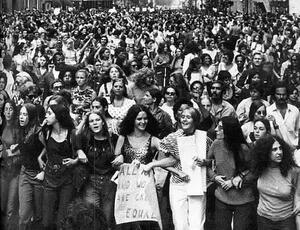"Women Strike for Equality"
On August 26, 1970, a gathering of 10,000 women in New York took to the streets of Manhattan to both celebrate the 50th anniversary of the 19th Amendment and demand further rights for women. The march was organized by Betty Friedan and a coalition of feminist activists, including the National Organization for Women (NOW), the YWCA, the National Coalition of American Nuns, Feminists in the Arts, and Women Strike for Peace.
Ten thousand women marched down New York's Fifth Avenue on August 26, 1970, to mark the fiftieth anniversary of the passage of the 19th amendment, which granted women the right to vote. Far from a simple celebration, the march was part of a "Women's Strike for Equality" organized by veteran feminist leader Betty Friedan. Friedan had called for the strike in a March 20 speech in Des Plaines, Illinois, and had planned the day's events with a coalition of both veteran and younger feminist women.
The march featured placards with slogans like "Don't Iron While the Strike Is Hot," "End Human Sacrifice—Don't Get Married," and, more simply, "Women Demand Equality." Among the groups participating were the National Organization for Women, the Young Women's Christian Association, the National Coalition of American Nuns, Feminists in the Arts, and Women Strike for Peace. The women marching, and participating in the day's other actions, were diverse, but they presented three clear demands, repeated in every media account of the strike. The Strike movement demanded free abortion on demand, free 24-hour community-controlled child care centers, and equal opportunity in jobs and education.
Events over the course of the day gave additional weight to these demands. In New York's City Hall Park, women staged a demonstration day-care center. Another group of women visited targeted companies and presented satiric "awards" for under-employing women and for creating degrading images of women. Similar events took place in other cities. Boston women marched in academic gowns with a banner reading "Veritas [Harvard University's motto] is a feminine noun." Pittsburgh women sponsored a day-long conference on women's rights. And women in several cities gathered signatures and staged rallies and marches advocating Senate passage of the Equal Rights Amendment.
In New York, the speakers at the evening march included a battery of Jewish women long active in the feminist movement. Congressional candidate Bella Abzug, writer Gloria Steinem, and former Miss America Bess Myerson Grant, then the city's Commissioner of Consumer Affairs, joined Friedan on the platform. Although Jewish women would later struggle with anti-Semitism and anti-Zionism within the American feminist movement, the 1970 strike was emblematic of the crucial role that Jewish women played in forming and advancing that movement.
Although businesses and retail stores reported little effect from the strike, the New York City mayor, New York State governor, and President Nixon all issued proclamations officially recognizing the day. Organizers were also pleased at the number of African-American women participating; the feminist movement had been largely a white, middle-class phenomenon. Despite some heckling from men and from reactionary women's groups, Friedan declared the day's events a success "beyond our wildest dreams."
Sources:New York Times, August 23, 1970; August 26, 1970; August 27, 1970; August 30, 1970; Amy Swerdlow, Women Strike for Peace: Traditional Motherhood and Radical Politics in the 1960s (Chicago, 1993).




Did Tiffany & Co. manufacture a sterling silver pin for women's Equality Day in shape of a Dove with the symbol for female engraved or stamped in it? The seller reports that it was made for the march. True or false?
I helped plan the events of that day and ran several, like the Mass for the Repose of the Soul of Male Supremacy in Times Square, where we put a plaque saying a statue of Sojourner Truth and Susan B Anthony would replace Father Duffy.. We also put out an edition of THE NOW YORK TIMES , " All the news that would give The Times fits" written as though women were running the world and began the day distributing copies in buses and subways and then, at The Times, where guards kept us from entering the elevators. Judy Klemesrud, a young Times journalist let us in thru a side door. We ran around the building giving copies to everyone .. ( later women employees sued The Times)... We ended up meeting with the then editor, who treated us with disdain. The Times underplayed the success of that day and lied about the numbers who marched. Saying 10,000 marched! There were 50,000 or more marching. It was an incredible day that turned a small NOW organization and a few women's liberation groups into a Movement. Women we'd never heard of joined our march in NYC and all over the nation began to fight for rights in their cities , states and in the nation. It was an incredible time, with many successes and some great losses, like the ERA , which had passed Congress and Senate and died in the States.. However the Movement that day started still exists , though the momentum has changed. And Betty Friedan instigated all this. Jacqui ceballos.. www.vfa.us